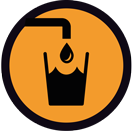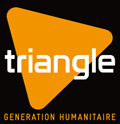AREA OF EXPERTISE

Water, hygiene and sanitation

AREA OF EXPERTISE

Water, hygiene and sanitation
FUNDING
In the Ouaka préfecture, Bambari has been and continues to be a gathering place for displaced populations fleeing conflict on the nearby axes. As per the Population Movement Commission report of June 2020 (date of the beginning of the project), 33,769 internally displaced persons (IDPs) are present in the seven IDPs sites in Bambari. Their presence adds tension on water resources and sanitation infrastructures of those sites. As a consequence, waterborne diseases or epidemics spreads are more likely.
TGH is present in the Ouaka prefecture since 2010. As part of the current project, TGH participates to the improvement of water, hygiene and sanitation access for the IDPs of Bambari, Because of the COVID-19 context, it is all the more important that the population and the IDPs have access to basic infrastructures. To ensure it is the case, TGH installs sanitation infrastructures and leads awareness-raising sessions on COVID-19 and related hygiene measures. Regarding access to water, the emergency measures such as water trucking are progressively replaced by sustainable infrastructures.

Unfinished traditional well (initial state), neighbourhoods Kidjigra and Mbagolo, Bambari, Ouaka, Central African Republic, April 2021 © TGH.

Fitting of the concrete rings, Kidjigra neighbourhood and Decamp neighbourhood Bambari, Ouaka, Central African Republic, April 2021 © TGH.
During the monitoring visit in the return neighbourhoods of Bambari town conducted as part of past projects, the TGH team noticed a mere absence of latrines. This ECHO-funded project addresses this issue: TGH builds on the one hand semi-permanent latrines and on the other hand supports the building of family latrines. The activities also include rehabilitation of the existing infrastructures in the IDPs sites so as to enable safe and dignify access to the latrines and showers. Handwashing stations are installed in a few public places in Bambari, such as the marketplaces and water points. Hygiene kits composed of a plastic jug and soaps are also distributed to the vulnerable households among the host community.
Parallel to the installation and rehabilitation of sanitary infrastructures, awareness-raising session on hygiene are organised and the key steps of handwashing are displayed next to the handwashing stations. The complementarity of both activities enables to fight against the spread of COVID-19 and to ensure that the IDPs and host communities of Bambari have access to water, hygiene and sanitation. The combination of both activities eventually reduces the propagation of COVID-19 and of other waterborne diseases in Bambari.
This project falls within in a long-term strategy of empowerment of the population – especially regarding their access to drinkable water and the reduction of their dependency to aid with the replacement of water trucking by the drilling of wells on the one hand and the replacement of emergency latrines by semi-permanent latrines on the other hand. In order to sustain the infrastructures, TGH reinforces community participation of the beneficiaries.